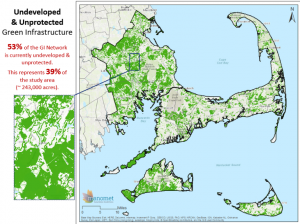As covered in the July newsletter, Manomet is working at a regional scale in eastern Massachusetts to develop and implement regional green infrastructure programs in the Taunton River watershed and the Pine Barrens ecoregion. Maximizing the resilience and benefits provided by natural systems is a critical component of minimizing climate change-related impacts such as biodiversity loss, water quality degradation, sea level rise, and related economic damage. Expanding this work statewide in Massachusetts and establishing a conservation vision map for the state would link open space planning and climate change resiliency efforts.
Massachusetts has a long history of conservation planning, with many studies and associated maps completed over the years. These studies include government efforts such as the 2001 Massachusetts Statewide Land Conservation Plan, BioMap2, and the 2007 Massachusetts Coastal and Estuarine Land Conservation Plan. NGO efforts include Manomet’s green infrastructure work, Mass Audubon’s MAPPR tool, and Harvard Forest’s Wildland and Woodlands study.
 While it is good news that there are so many groups and the government focused on conservation, the diversity of plans and approaches presents several challenges: 1) cities and towns don’t have clear guidance on state and regional conservation priorities, 2) state conservation efforts are not optimally coordinated, and 3) climate change adaptation and mitigation concerns are not fully integrated. Additionally, many of the state-level analyses focus exclusively on large tracts of high value conservation land and therefore lack fine-grained detail at the local scale.
While it is good news that there are so many groups and the government focused on conservation, the diversity of plans and approaches presents several challenges: 1) cities and towns don’t have clear guidance on state and regional conservation priorities, 2) state conservation efforts are not optimally coordinated, and 3) climate change adaptation and mitigation concerns are not fully integrated. Additionally, many of the state-level analyses focus exclusively on large tracts of high value conservation land and therefore lack fine-grained detail at the local scale.
Full integration of climate change mitigation and adaptation concerns will require critical thinking about urban form, local development controls, and interplay between green and gray infrastructure. Manomet is serving as a service provider to many communities in eastern Massachusetts through the Municipal Vulnerability Preparedness (MVP) program, giving us a palpable sense of the climate hazards and challenges faced at the local level. Communities in Massachusetts are facing challenges like sea level rise, warming temperatures, habitat loss, and more. To address these needs, Manomet’s regional green infrastructure analyses include buffering of high-order streams, smaller wetlands complexes, and flood hazard areas.
The Massachusetts Executive Office of Energy and Environmental Affairs, Division of Conservation Services, is embarking on a year-long Resilient Lands Initiative, with the goal of updating the 2001 Massachusetts Statewide Land Conservation Plan. With a diverse set of stakeholders at the table, this update provides an opportunity to address the need for improved linkage of previous planning efforts and production of a unified green infrastructure map. Protecting our biodiversity and establishing resiliency to climate impacts statewide is critical for all of us who live, work, and visit Massachusetts.





 Back to all
Back to all
